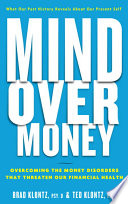

In 'Mind Over Money', the authors delve into the profound psychological impact that money has on human behavior. They argue that our relationship with money is deeply rooted in our emotions, beliefs, and experiences. This idea emphasizes that financial decisions are not merely rational choices; they are often influenced by feelings of fear, insecurity, and desire. The book illustrates how individuals can develop a distorted view of money, leading to anxiety and poor financial choices. By understanding the psychological triggers that drive our financial behaviors, readers can begin to reshape their attitudes toward money, fostering a healthier relationship that prioritizes well-being over materialism.
Continue readingThe book highlights various cognitive biases that affect our financial decisions. These biases, such as loss aversion, overconfidence, and the sunk cost fallacy, can lead to irrational behavior and suboptimal financial outcomes. For instance, loss aversion explains why people are more distressed by losses than they are pleased by equivalent gains, often resulting in overly cautious investment strategies. By recognizing these biases, readers can learn to mitigate their effects, making more informed and rational financial decisions. The authors provide strategies for overcoming these biases, emphasizing the importance of self-awareness and critical thinking in financial planning.
Continue readingThe authors stress the importance of financial education in fostering a positive relationship with money. They argue that many individuals lack the necessary knowledge and skills to make sound financial decisions, leading to stress and poor outcomes. The book advocates for comprehensive financial education that covers budgeting, saving, investing, and understanding credit. By equipping readers with the tools to manage their finances effectively, the authors aim to empower individuals to take control of their financial futures. This emphasis on education underscores the idea that informed decision-making is a key component of financial wellness.
Continue readingAnother central theme in 'Mind Over Money' is emotional spending, which refers to purchasing decisions driven by emotions rather than needs or rational thought. The authors explain how stress, sadness, or even happiness can lead individuals to overspend or make impulsive purchases. This behavior can create a cycle of guilt and financial instability. The book provides insights into recognizing emotional triggers and developing healthier coping mechanisms, such as mindfulness and delayed gratification. By addressing the root causes of emotional spending, readers can cultivate better financial habits and enhance their overall well-being.
Continue readingSetting financial goals is a crucial aspect of effective money management, as discussed in the book. The authors emphasize the need for clear, achievable goals that align with one's values and priorities. By establishing specific objectives, individuals can create a roadmap for their financial journey, making it easier to track progress and stay motivated. The book outlines strategies for setting both short-term and long-term goals, encouraging readers to visualize their desired outcomes. This focus on goal setting not only enhances financial discipline but also fosters a sense of purpose and direction in life.
Continue readingA significant takeaway from 'Mind Over Money' is the importance of cultivating a healthy money mindset. The authors argue that one's beliefs about money can significantly impact financial behavior and overall happiness. They encourage readers to challenge negative beliefs, such as viewing money as inherently evil or associating self-worth with wealth. By reframing these beliefs and adopting a more positive and constructive attitude toward money, individuals can reduce anxiety and improve their financial decision-making. The book provides practical exercises and reflections to help readers develop a mindset that supports financial well-being.
Continue readingFinally, the book explores the relationship between money and overall life satisfaction. While money is often seen as a means to an end, the authors argue that it can also play a significant role in enhancing quality of life. They discuss research on the correlation between income levels and happiness, emphasizing that while financial security is important, it is not the sole determinant of life satisfaction. The book encourages readers to consider how they can use money to enrich their lives and the lives of others, promoting a more holistic view of financial well-being that encompasses emotional and social dimensions.
Continue readingThe reading time for Mind over Money depends on the reader's pace. However, this concise book summary covers the 7 key ideas from Mind over Money, allowing you to quickly understand the main concepts, insights, and practical applications in around 22 min.
Mind over Money is definitely worth reading. The book covers essential topics including The Psychological Influence of Money, Cognitive Biases in Financial Decision-Making, The Role of Financial Education, providing practical insights and actionable advice. Whether you read the full book or our concise summary, Mind over Money delivers valuable knowledge that can help you improve your understanding and apply these concepts in your personal or professional life.
Mind over Money was written by Brad Klontz, Ted Klontz.
If you enjoyed Mind over Money by Brad Klontz, Ted Klontz and want to explore similar topics or deepen your understanding, we highly recommend these related book summaries:
These books cover related themes, complementary concepts, and will help you build upon the knowledge gained from Mind over Money. Each of these summaries provides concise insights that can further enhance your understanding and practical application of the ideas presented in Mind over Money.